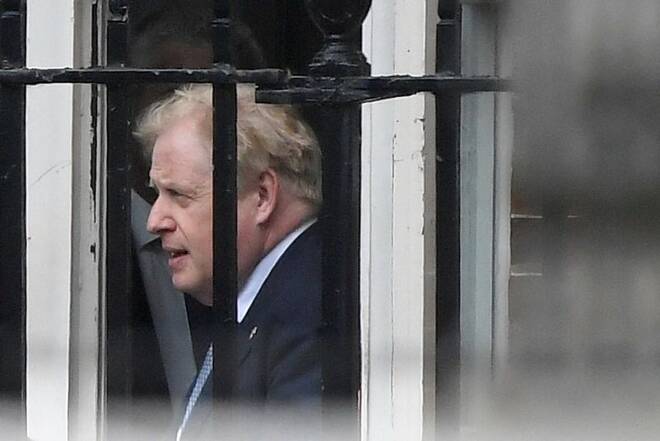Advertisement
Advertisement
Analysis-Sterling traders see Johnson emerging weaker from confidence vote
By:
By Lucy Raitano and Sujata Rao (Reuters) - The pound firmed on news of the confidence vote against British Prime Minister Boris Johnson, betting he will emerge weakened as a leader and less likely to succeed with potentially damaging changes to a key Northern Ireland trade agreement.
By Lucy Raitano and Sujata Rao
(Reuters) – The pound firmed on news of the confidence vote against British Prime Minister Boris Johnson, betting he will emerge weakened as a leader and less likely to succeed with potentially damaging changes to a key Northern Ireland trade agreement.
Johnson is widely expected to survive Monday’s vote, called after growing numbers of lawmakers in his Conservative Party questioned his flagging authority over the “partygate” scandal, which led to a series of fines for gatherings in his Downing Street office and residence that broke COVID-19 lockdown rules.
A majority of the 359 Conservative lawmakers — at least 180 — would have to vote against Johnson for him to be removed.
Bookmaker William Hill gave odds of 2/7 for Johnson to survive, versus 5/2 that he would lose. Broadly, his removal or survival may not change the dismal outlook for the currency and economy, but some saw the vote in itself as a positive.
“Sterling has been soggy for a while, and one of the reasons is the twin clouds of uncertainty from the economy and politics,” said Philip Shaw, chief economist at Investec, adding that the vote could help disperse one of the clouds.
“The vote of confidence in the prime minister from within his own party paves the way for a potential change of prime minister and therefore a shift in positions in some of the key policies,” Shaw said, citing Johnson’s plans to scrap the Northern Ireland protocol, part of Britain’s post-Brexit trade agreement.
The plans raise the risk of an economically damaging trade war with the European Union, analysts say. The EU has deemed them unacceptable.
Sterling firmed half a percent against the dollar and euro, benefiting also from broad dollar weakness and upbeat world markets, while a FTSE index of domestically geared stocks rose 1%.
Some were more blunt, expecting momentum against Johnson to gather force. Indeed, comparison site Oddschecker says 88% of wagers being placed were for him to be replaced later this year.
“The view is (Conservatives) were more likely to lose the next election with Johnson still as leader, whereas a new leader could improve their chances of holding on to power, which markets may believe is a more pound-positive outcome,” said Sarah Hewin, senior economist at Standard Chartered.
That outcome for the Conservatives, seen as a business-friendly party, may be seen as better in the medium-term for sterling, she added.
Economic pain
The vote comes at a fraught time for the UK economy, which appears to be hurtling towards recession, the worst cost-of-living squeeze since the 1950s and the highest inflation among the world’s seven biggest economies.
Signs of economic pain mean markets have dialled back bets on interest rate rises, now seeing 145 basis points of hikes by year-end, down from 165 a month ago.
That has in turn weighed on the pound, with bets against the currency recently hitting the highest since September 2019, according to the U.S. Commodity Futures Trading Commission.
Sterling is down over 7% versus the dollar this year, making it one of the worst performing major currencies so far in 2022.
Even if Johnson is ejected, his successor will struggle to engineer policy changes to turn around an economy hit by soaring energy prices, labour shortages and fast-falling consumer confidence, said UBS Global Wealth Management’s chief UK economist Dean Turner.
Turner said a candidate who was “softer at the edges” on Brexit and Northern Ireland could lift the pound near-term, but noted “whoever replaces Johnson would face the same set of problems”.
“What would be a game-changer would be if we get more clarity on the economy in either direction, which can play into the Bank of England’s next move,” Turner said, predicting the bank to pause rate hikes after August.
That in turn limits pound upside, he reckons.
“I can’t see the BoE tightening policy when the economy is slowing sharply,” he said.
(Reporting by Lucy Raitano, Sujata Rao and Marc Jones; Editing by Sujata Rao and Alison Williams)
About the Author
Reuterscontributor
Reuters, the news and media division of Thomson Reuters, is the world’s largest international multimedia news provider reaching more than one billion people every day. Reuters provides trusted business, financial, national, and international news to professionals via Thomson Reuters desktops, the world's media organizations, and directly to consumers at Reuters.com and via Reuters TV. Learn more about Thomson Reuters products:
Did you find this article useful?
Latest news and analysis
Advertisement
